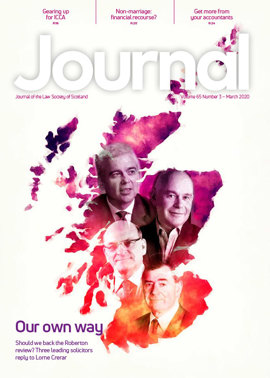Profile: Jim Drysdale
What motivated you to pursue a career as a solicitor?
 My father, a farmer and racehorse trainer, died when he was 39 and I was 13, the eldest of four boys. Estate duty and capital gains tax were payable on his death to a top slice of 90%. Our existence had been comfortable until then and I still do not know how my mother coped. My motivation in going into the law was to try and ensure that what had happened to us did not happen to others. This job is first and foremost about helping people, and we should never lose sight of that.
My father, a farmer and racehorse trainer, died when he was 39 and I was 13, the eldest of four boys. Estate duty and capital gains tax were payable on his death to a top slice of 90%. Our existence had been comfortable until then and I still do not know how my mother coped. My motivation in going into the law was to try and ensure that what had happened to us did not happen to others. This job is first and foremost about helping people, and we should never lose sight of that.
Tell us about your career so far...
I am now in my 41st year in the profession. I started from a private client perspective, developing the rural business and family business aspects as we went along. I see private client and rural business work as going hand in hand. Succession issues are huge for family businesses, and my colleagues and I are heavily involved in succession planning. I have also been very involved with environmental issues. I did my apprenticeship with Brodies, was an assistant at Murray Beith & Murray, then joined J & F Anderson, the Anderson part of what became Anderson Strathern, where I was for 30 years (26 as a partner). I have now been six years with Ledingham Chalmers, helping Linda Tinson build a private client and rural client base.
What made you join the Rural Affairs Subcommittee?
Put simply, at my stage of career, I saw it as an opportunity to give something back. Since the advent of the Scottish Parliament, the rural sector has never been under such continuous scrutiny and I hope that commenting on proposed legislation on occasion ameliorates the effect of unintended consequences. On account of my environmental interests I am also on the Environmental Committee.
Have your perceptions of the Society changed since you joined the committee?
Yes. The range of the committees and the work they do is not something I was aware of from the outside. The committees could not do their work without the excellent assistance and direction of the committee secretariat.
What has been the most surprising aspect of your work at the Society?
I think it is the seeming relentlessness of the consultations and the amount of work involved in dealing with them. We have also had cross-committee input into consultations where appropriate, which is aided by the secretariat.
What are the main issues that you think the Society has to address at the moment?
Seeking to strike a balance between information overload and keeping members apprised of what the Society is doing for them, which is not easy with so much going on. Promotion of the profession is also difficult to balance with the regulatory function.
If you could change only one thing for members, what would it be?
Less reliance on time recording and more on business development and running the business.
What’s your top tip for new lawyers?
Work in an area that interests you and do not specialise too soon. A breaking down of silos is required to give a more fulfilling role.
What keeps you busy outside of work?
A lifetime with horses provides a work antidote and has enabled the most amazing African horseback safaris. My wife and I run the Balcormo Races, being the Fife point to point.
A fishing rod in hand also has the added advantage of the aquatic environment being hostile to mobile phones, which thus have to be left behind!
Click here for details of how to submit your views on crofting law reform.






